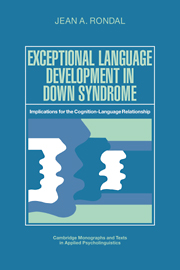 Exceptional Language Development in Down Syndrome
Exceptional Language Development in Down Syndrome Book contents
- Frontmatter
- Contents
- Foreword by Neil O'Connor
- Acknowledgments
- 1 Introduction
- 2 Language development in Down syndrome
- 3 Exceptional language development in mentally handicapped individuals
- 4 Cognition-language relationships and modularity issues
- 5 A case study
- 6 Theoretical discussion
- 7 General conclusions
- Appendixes
- References
- Index
6 - Theoretical discussion
Published online by Cambridge University Press: 23 December 2009
- Frontmatter
- Contents
- Foreword by Neil O'Connor
- Acknowledgments
- 1 Introduction
- 2 Language development in Down syndrome
- 3 Exceptional language development in mentally handicapped individuals
- 4 Cognition-language relationships and modularity issues
- 5 A case study
- 6 Theoretical discussion
- 7 General conclusions
- Appendixes
- References
- Index
Summary
As reviewed in Chapter 3, there is a small number of documented cases of mentally handicapped individuals with exceptional language capacities despite otherwise severe cognitive limitations. The case of Françoise is particularly striking among these cases, and so far it is undoubtedly one of the most thoroughly studied. This case, as do the others, begs for an explanation. How is such a state of affairs possible? Before trying to approach this difficult question, let me review the extent to which linguistic development of the type exhibited by Françoise is truly exceptional in comparison with other (typical) mentally handicapped persons.
Exceptional and nonexceptional language development in mental handicap
As I have demonstrated in what precedes, Françhise's nonlinguistic cognitive abilities in general are only moderately better than what is known of most Down syndrome persons. Her performance IQ on the WAIS is 60 (64 at the second administration) and she is credited with a nonverbal MA of 5 years and 8 months on the EDEI scale. This performance IQ is higher than the reported mode of 45–50 for the typical trisomy 21 DS population (Moor, 1967; Gibson, 1981). However, her nonverbal MA is almost compatible with the average MA of the DS population, which is about 5 years (again according to Gibson, 1981). Although cursorily presented as nonverbal, the performance section of the Wechsler Scales actually is saturated with speech (e.g., the instructions in each subtest are given verbally), which, of course, may favor those subjects with a good receptive command of the language. This may account, at least partially, for the difference between Françhise's nonverbal IQ and the population modal IQ for typical trisomy 21 DS.
- Type
- Chapter
- Information
- Exceptional Language Development in Down SyndromeImplications for the Cognition-Language Relationship, pp. 210 - 266Publisher: Cambridge University PressPrint publication year: 1995


